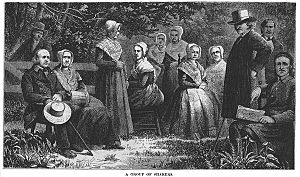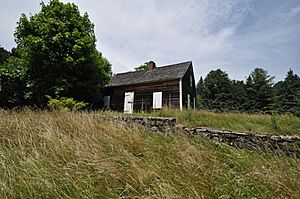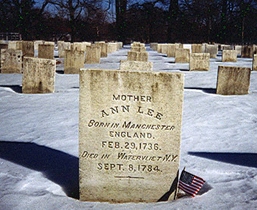Ann Lee facts for kids
Quick facts for kids
Ann Lee
|
|
|---|---|
| Born | 29 February 1736 Manchester, England, Kingdom of Great Britain
|
| Died | 8 September 1784 (aged 48) Watervliet, New York, U.S.
|
| Burial place | Watervliet Shaker Village, Colonie, New York |
| Other names | Ann Elizabeth Lees Ann Standerin |
| Occupation | Founder of the Shakers Preacher Singer Missionary |
| Years active | 1758–1784 |
| Spouse(s) | Abraham Standerin (separated c. 1775) |
| Children | 4 (all died in infancy) |
| Parent(s) | John Lees |
| Relatives | William Lee (brother) Nancy Lee (niece) |
| Religion | Christianity |
| Denomination | Shaker |
| Signature | |
 |
|
Ann Lee (born February 29, 1736 – died September 8, 1784) was a very important religious leader. She is known as Mother Ann Lee and founded the Shakers. After her death, the group changed its name to the United Society of Believers in Christ's Second Appearing.
Ann Lee lived during a time of great religious change in England. She became a key figure who deeply influenced religion, especially in America. In 1774, after being part of a religious movement for almost 20 years, Ann Lee and a small group of her followers moved from England to New York.
After a few years, they settled in Niskayuna. They rented land in Albany County, New York (now called Colonie). Their worship included energetic dancing, which looked like "shaking." This is how they got the nickname "Shakers." Ann Lee preached to many people and led the Shaker church. This was unusual because few women were religious leaders back then. Many people saw her as a female representation of God.
Contents
Ann Lee's Early Life
Ann Lee was born in Manchester, England. She was the second of eight children. She was baptized at Manchester Collegiate Church (now Manchester Cathedral) when she was six years old. Her parents were part of a group called the Society of Friends (also known as Quakers). They were very poor and could not afford to send their children to school. Ann Lee never learned to read or write.
Her father, John Lees, worked as a blacksmith and a tailor. Ann Lee's original family name was probably Lees, but it later changed to Lee. We don't know much about her mother, except that she was very religious. When Ann was young, she worked in a cotton factory. Later, she worked as a cook at a hospital in Manchester.
In 1758, Ann Lee joined an English religious group. This group was started by Jane Wardley and her husband in 1747. This group was the beginning of what would become the Shakers. People often called them the "Shaking Quakers." They were similar to Quakers but also believed in cleansing sins through chanting and dancing. Jane and James Wardley believed that God would return soon, and that God would appear as a woman. They believed Ann Lee was this woman. This is why she later became known as "Mother Ann."
Ann Lee believed that the shaking and trembling during worship helped to remove sin from the body. She thought this process purified the worshiper through the power of the Holy Spirit. Her beliefs were shaped by her early exposure to the Quaker religion. They were also influenced by seeing a lot of sin in the city where she lived and worked.
Eventually, her father arranged for her to marry Abraham Stanley (also known as Abraham Standarin). They married on January 5, 1761. Ann Lee became pregnant four times, but sadly, all her children died very young. These losses made her think deeply about her beliefs. She developed strong religious ideas. She believed that not marrying and confessing sins were the only true ways to reach salvation. She also thought these were the only ways to create God's kingdom on Earth. The Shaking Quakers also believed in an "Inner Light" and personal messages from God, similar to the Quakers.
Ann Lee Becomes a Leader
In England, Ann Lee became well-known. She encouraged other believers to preach more openly about the second coming of Christ. She also urged them to speak out against sin in new and bold ways. She said she had visions and messages directly from God. In one vision, she claimed God told her that living without marriage (celibacy) and confessing sins were the only paths to salvation. She believed these were the only ways to establish God's kingdom on Earth.
Ann Lee was often put in prison. This was because she would dance and shout during worship, which was seen as breaking the Sabbath. She was also accused of speaking against religious beliefs. She claimed she had many miraculous escapes from danger. She once said she spoke to four church leaders for four hours in 72 different languages.
Ann Lee also believed she would be the second appearance of Christ. Around 1770, her group chose her as their "Mother in spiritual things." She called herself "Ann, the Word" and "Mother Ann." After being released from prison a second time, people said Mother Ann performed miracles, like healing the sick. Ann Lee eventually decided to leave England for America. She wanted to escape the constant arrests and prison stays she faced in Great Britain. She also felt called to share her beliefs during the religious "Awakening" happening in America.
Moving to America
In 1774, Ann Lee felt a divine message telling her to take a special group to America. Her husband came with her, but he left her soon after they arrived. Others who came were her brother, William Lee; her niece, Nancy Lee; James Whittaker, who was raised by Mother Ann; John Hocknell, who paid for the trip; his son, Richard; James Shepherd; and Mary Partington.
These nine people sailed on a ship called the Mariah. They landed in New York City on August 6, 1774, after three months at sea. They stayed in New York for almost five years. In 1779, John Hocknell leased land in Niskayuna, near Albany. The Shakers settled there, and their unique community began to grow. Not long after they arrived, Ann's husband left her, and she never saw him again.
During the American Revolution, Ann Lee and her followers remained neutral. They believed in being pacifists, meaning they did not support either the British or the American colonists. This caused problems for the Shakers. People were suspicious because they refused to sign an oath of loyalty to either side.
Ann Lee began sharing her religious message with the public on the famous New England's Dark Day in May 1780. On this day, the sun seemed to disappear, and it became so dark that people needed candles indoors at noon. She quickly gained many followers. Some of these new followers had been part of a religious revival in New Lebanon, New York, in 1779, including Lucy Wright.
Starting in the spring of 1781, Mother Ann and some followers went on a long journey. They traveled through Massachusetts and Connecticut to find new members. They often stayed in the homes of people who supported them, like the Benjamin Osborn House. There were also songs that were said to be hers, which were sung without words. On this journey, they converted many people, and 18 Shaker villages were started. People who saw her said she performed many miracles during this time.
Ann Lee's journey through New England was very successful. She especially converted groups who were already different from the main Protestant churches in New England. However, for the mainstream churches, her ideas were too different. Ann Lee herself understood how revolutionary her ideas were. She once said, "We [the Shakers] are the people who turned the world upside down."
The Shakers sometimes faced angry crowds. In places like Shirley, Massachusetts, Ann Lee was hurt by these groups more than once. Because of these difficulties, Mother Ann became quite weak. She died on September 8, 1784, at the age of 48. Her mission ended when Ann and her brother William were attacked by a crowd and badly injured. They returned home. William died a year later, and Ann was very weakened. She died only a few months later, likely because of the hardships she had faced and the loss of her brother. She died in Watervliet. Both William and Ann are buried in the Shaker cemetery in the Watervliet Shaker Historic District.
It was said that in her last days, Ann was "singing in unknown tongues" while sitting in her rocking chair. Mother Ann's followers came to believe that she showed all the perfect qualities of God in a female form. They saw her as the "second coming" of Christ. The idea that Ann Lee was seen as Christ's female equal was very unique.
It is believed that Shakers in New Lebanon, New York, experienced a 10-year period of special messages from God starting in 1837. This was called the Era of Manifestations, or "Mother Ann's Work." However, the number of Shakers slowly decreased over time, and the religion gradually faded. Before the Civil War, 19 official Shaker communities were established in the Northeast, with about 6,000 members.
Shaker Beliefs and Lifestyle
The Shakers had many beliefs that were similar to the Quakers. These included believing in equality for everyone, living in a community, and being pacifists (not believing in war). However, they were different because Shakers believed in celibacy, meaning they did not marry or have children. Ann Lee herself practiced this, even when her husband was still around.
The Shakers were very focused on creating a perfect community where everything was shared. Everyone supported each other. They lived in villages and shared large dormitory-style homes. They encouraged everyone to live without marrying. They also worked hard to find new people to join their faith.
The Shakers were known for their hard work and many inventions. These included the screw propeller, babbitt metal, the automatic spring, and the turbine waterwheel. They were the first to package and sell seeds. At one point, they were the largest producers of medicinal herbs. They were also famous for their dances and songs, which are considered folk art. Today, Shaker furniture is highly valued because it is both beautiful and functional, and it lasts a very long time.
Cultural Legacy
Ann Lee is remembered in:
- Judy Chicago's The Dinner Party
- The afterword of the novel A Maggot
- A song, "The Heart Of Ann Lee", on the 2010 album All This Longing by English folk singer-songwriter Reg Meuross
See also
- Millennial Praises
- the Public Universal Friend, contemporary leader of another new religious movement
- List of people who have claimed to be Jesus
 | Charles R. Drew |
 | Benjamin Banneker |
 | Jane C. Wright |
 | Roger Arliner Young |





